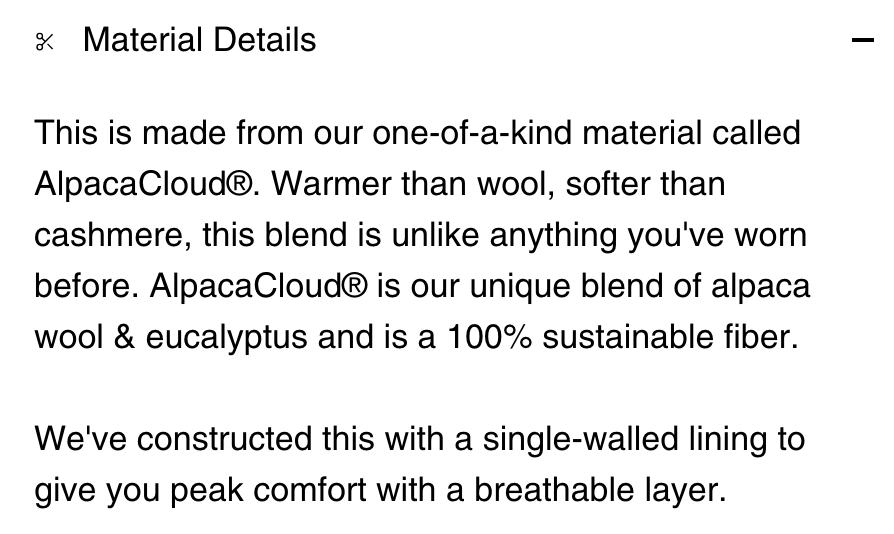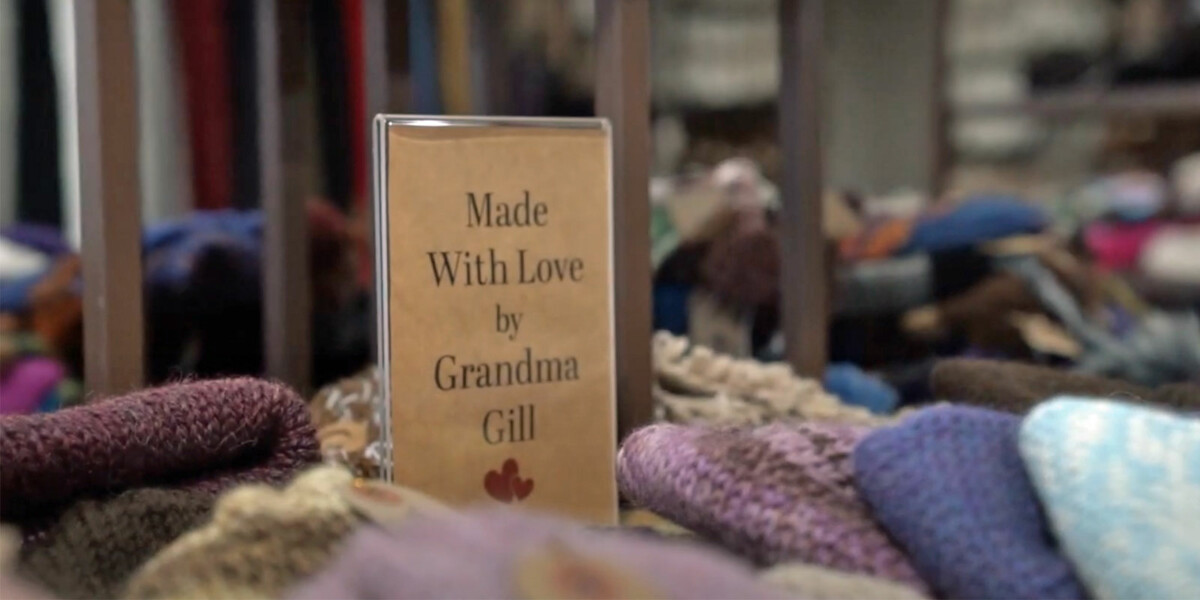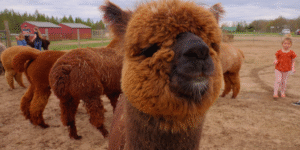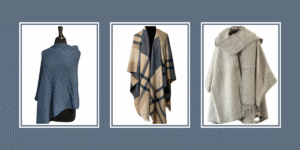When I first opened our alpaca farm and store, I was enthralled by the allure of alpaca. Soft, warm, hypoallergenic, and so sustainable. They felt magical to me.
Along the journey, I discovered the alpaca industry is full of people who love these amazing creatures as much as I do. We are passionate about the animals, the amazing fiber they create, and the sustainable goods they produce. We treat our alpacas like pets, we love them, and we take great pride in the goods we produce from their annual fiber shearing.
What I also discovered is the imposters who misrepresent alpaca products, hide important details on materials and their origin, and confuse (and scam) buyers. The internet is now filled with alpaca products that are nothing but real alpaca.
This is what makes me sad about the cheap alpaca products people are buying online:
- They have very low percentages of alpaca fiber.
- They are imported from China.
- They are sold by people who don’t care about the animal or the industry.
- They dominate Google searches and listings on Amazon or Etsy.
- They create confusion and mistrust for consumers, while also leaving these buyers with low-quality products.
The unfortunate part of all of this is it is very hard for American alpaca breeders to stop it. We have very limited commercial production of alpaca products in the USA, and this constraint makes it extremely hard to create a robust production channel to fuel the consumer demand for sustainable and legitimate alpaca products.
Our Effort to Produce Authentic, USA Made Alpaca Products
My husband and I have been desperately trying to turn our raw alpaca fiber into finished goods.
We’ve sent our fiber to small cottage mills to produce yarn, which then goes to my mother-in-law and other local artisans to make hats, mittens, scarves, and shawls. While this works, it is a process, and it is limited to these ladies’ skills and the small mills that have a 12+ month turnaround for producing the yarn required for knitting and weaving.
We’ve sent our raw fiber to mills to make dryer balls, rugs, and trivets. This is doable, but it is hard to sell against much cheaper dryer balls being represented as alpaca and sold on websites like Amazon.
We’ve also worked with our friend Stacie to make USA made alpaca socks and blankets from our fiber. God bless Stacie and her utter patience in guiding us through this experience and coordinating all the people needed to create goods at this level.
For these commercial socks and blanket runs alpaca fiber has to go through a multi-step process:
- Each individual fiber blanket is reviewed and sorted by an experienced fiber mill owner at our farm
- Next, the raw fiber is sent to a company to wash and scour it
- Then the clean fiber goes to a spinner who whips this into yarn
- Then the yarn heads off to another company to get knitted into socks or weaved into a blanket
- Then it comes back to me in Michigan to label and sell it
My husband and I are super proud of the products we’ve been able to produce, and we are working on another sock run with Stacie now. But it isn’t enough. We need more. This supply chain is fragile, limited, and more and more companies are closing their businesses.
Raw fiber sits in barns, basements, and storage units across the United States. And it sits there for years. This is not by choice. It is because our industry lacks an ecosystem to execute beyond breeding and showing alpacas.
My husband Jason has been working with other alpaca ranches and farms to get unused fiber out of their barns and storage units so we can transform it into goods. We know this process is slow and a huge investment for us, but it is critical to creating USA made products and keeping our alpaca industry viable.
Here’s the reality of the situation:
- If we can’t use the alpaca fiber grown in the USA, there is no point in raising these beautiful animals here in the States.
- We must create goods from their annual fiber growth for the alpaca industry to be sustainable moving forward.
That statement seems so logical to me, yet no one seems to be talking about it. I just don’t understand.
The Case for Peruvian Made Products
With all of our efforts and investment, our commercial production runs and locally made goods only cover a portion of what we offer in our farm and online store. We simply cannot collect and produce enough alpaca goods to satisfy the consumer demand.
This means we are forced to go back to Peru and purchase goods from the artisan network there. For me, this is an acceptable action because alpacas originated in Peru and the Peruvian people are still a vital portion of our alpaca industry here in the States. Our top alpaca lineages came from Peru, virtually all of the alpaca husbandry knowledge comes from Peru, and ongoing research to advance the industry still happens in Peru. And heavens, they are just wonderful people.
I am often asked why we don’t have more products in our store made in the USA and from our animals. We are trying, but there is a limit to how much change you can force at one time.
As a result, I work directly with the Peruvians to source these extra goods, or I go through a few USA-based wholesalers who I know use Fair Trade Certified artisans. Meaning, that the farmers and workers are paid a fair rate, they have rights, and the farms follow environmental standards.
The Dangers of Amazon, Etsy, and Quince
Now let’s circle back to the alpaca products on Amazon. It’s important you ask yourself a few questions before buying off these websites.
I challenge you to consider the following before making a purchase:
- Do you know where those goods come from?
- Do you know what the products are made of and how much of each material is within the product?
- Do you know what grade of alpaca fiber is used? Is it royal, baby, superfine, or lesser quality?
- Do you know who is selling them to you?
- Is the fiber grown and harvested humanly?
- Is the production process of goods eco-friendly? Can you talk to an actual live person?
The answer to most of those questions is no. When you buy an alpaca product from a large network like Amazon or a big retailer like Quince, you don’t know what you’re really buying, where it comes from, who is selling it to you, or if the animal who grew it lives a life worth living.
Don’t believe me? Let’s look at two examples.
In the Amazon example, the “alpaca socks” only have 10% alpaca. This Amazon example has 20% wool, but this is an undisclosed wool, so you have no idea if you’re allergic to it. The rest is 40% cotton and 30% polyester. That is 70% of non-fiber materials, which means these socks won’t be warm, breathable, or anything else they are claiming.

In the Quince example, you have no idea how much alpaca you are buying in the “alpaca sweater” they are marketing. It could be 30% or 3%. Based on the ultra-low price, I’m going to bet everything I own that it isn’t 50% or more. And if you read the last bullet you’ll see the wool is sourced from Peru, but it is sent all the way to China to knit, then back to the USA to sell. That is not a sustainable product and heavens knows what is being added during the China production process.

In the Follow Your Legend example, you’ll see the material list for an alpaca sweatshirt. While the sweatshirt looks lovely, the buyer has no idea how much alpaca is in it. When specifically asked about this in a comment on a Facebook ad, the company replied they didn’t know. And if you look at the example, you have no idea if you’re purchasing a sweatshirt with 5% alpaca or 95% alpaca.

The same is true for Etsy, eBay, and all those other massive e-commerce networks. You never know what you’re buying and who you’re buying it from. You the buyer are at risk if you don’t review materials and question the source of materials and manufacturing.
You Are a Major Part of the Solution
These fake and misrepresented products break my heart, frustrate me, and anger me. I love my alpacas way too much to watch our industry falter. I look at my favorite alpacas Nibbler, Sherry Ann, or Jalapena and I wonder what the future holds for them and their offspring. Do the people who buy these cheap, imported, and fake goods know how special these ladies are? Do they know my alpaca girls are intelligent creatures who love humans, greet us as we approach, give us kisses, and love us as their owners? Do they know their purchases of fake and China-made goods further fracture the longevity of the industry I hold so dear?
What can you do to help change this situation? A lot. Here is what I ask:
- Purchase alpaca products from actual farms and breeders.
- Understand that we have constraints on how much we can produce and that some items do need to come from Peru.
- Know that these purchases help support our industry and the care for these amazing animals.
- Look at the materials used for products and question the seller if tags or online descriptions don’t make this clear.
- Visit a local alpaca farm so you can meet these lovely animals up close and personal.
- Stay away from large e-commerce networks and their products.
- Know that a pair of alpaca socks cannot be made and sold at a retail price $9.99. It is currently not possible in the U.S. or Peru.
We need to do better, and we can do better. All of us. And we need to. We owe it to the alpacas.
I’m going to do my part. One alpaca kiss, one shearing, and one product at a time.





My dear friend,
Thank you for this. It needed to be said and understood by everyone who love and care for your beautiful furry friends. I could feel it in my heart. I will continue your message through my friends . Change and understanding need to occur.❤️
Thank you for this information! I have a small alpaca farm in western New York and invite loads of visitors to meet my alpacas and llama. I sell my own hand knitted items along with other items, both from here in the states and Peru. The Peruvian company is fair trade and the folks who buy their products love them, especially the socks.
I’d like to help in anyway I can (even though I’m a small fry in the business). My animals are loved and cared for as if their my kids, so I love to share that with anyone who is curious. This is my tenth year and although I don’t have a lot of revenue from it, it’s all about the alpacas for me.
Excellent!
Thank you
Thank you for putting into words my thoughts and feelings. I own a small alpaca farm in Northeast Ohio and treat these animals like they are my kids. My friend(who also owns alpacas) and I combine our fleece harvests every year. We send the best quality fiber to a mini mill to be made into yarn and then hire artisans to make the items into hats, mittens, scarves, shawls, etc. We make our own dryer balls and felted soap. We have some of our fiber made into felted sheets and then make handbags out of that. We sell our products at Craft shows in our local area. It is truly a labor of love as we dont make a whole lot of money doing it. I totally agree that we Americans who own alpacas have to get together to promote US made alpaca products. Many groups have tried, but none have succeeded. Your message needs to be spread far and wide.
Great publicity for the Alpaca industry! We own a herd of 37 and regularly participate at Farmers Market with our products. We also operate a store at the farm.
My wife and I own New Era Fiber. I would love to have a deep discussion with you about this topic. What you are saying needs to happen but it is extremely difficult. I say that after 15 years of working on exactly what your saying. If you are ever near Nashville please come visit to talk.
Perfect! Thank you!! We were just discussing this very thing last week at an impromptu lunch with a couple other alpaca folks. I vend every Saturday at our local, year-round, farmers market. I work to educate buyers about the industry and why some of my products come from coops and some from fair-trade vendors. Why some are 100% alpaca and why some are not; how it differs from wool etc. Thank you for SO much for doing all you do and for sharing this!
Thank you, Rebecca, for voicing these important issues. We must continue to have vision and find ways to increase the national herd while we address the need for quality control in the alpaca fleece industry. In my opinion, even merino adulterates alpaca, adding back in the allergens and susceptibility to microbes that alpaca prevents. We need to find a way to stretch our supply of alpaca without cheapening it.
Thank you for saying what a lot of us are thinking and experiencing! We’ve raised alpacas, primarily suris, for 25 years, and what to do with our fiber is STILL our biggest hurdle. We’re working on it and this year have concentrated on having larger quantities of our fiber processed into end products by US mills. Excited to have more products in our farm store made from our own fiber.
The struggle is real. As a mill owner, we work so hard to get these yarns & other products Back into the Farmers hands. Equipment failures, personnel issues/costs and health costs (running a mill is incredibly dangerous) all contribute to the slow turnaround. Having Larger batches of “like quality” fibers allows us mills to run the yarns through more efficiently, but doesn’t generally work well for the smaller Alpaca farms.
Please consider starting a mill. The Solution is in our hands. One person can change their whole local fiber economy.
New cottage industry sized equipment is being designed (Brother’s Drum Carder) and other manufacturers have a long successful track record ( Belfast Mini Mills & Ramella). Spinning singles, then weaving into consumers product has SUCH an unmet demand.
Plus, there are older equipment available – Dirt cheap- currently looking for new owner’s/ caretakers! Let’s build something together & take back our US textile industry.
I appreciate your comments on the need for ways to produce goods from American alpacas, and the problem of cheaply made products of dubious ethics on the market. We have our fiber from our beloved alpacas made into yarn, rugs and socks that we sell on Etsy. We have to compete with cheap mass produced “alpaca” products of low quality from questionable sources. Uninformed buyers do not understand the difference between those products and the quality, ethical products of small farm producers.
Thank you for the information! I was looking on Amazon for Alpaca yarn but was having a hard time finding the country of origin and manufacturer. Likely because they are all fake or not from good farms. Thank you for all you do!!!
It is expensive to sell on Amazon. Between Amazon fees and unrealistic return policies, you won’t find real alpaca farms selling yarn there. You really need to go directly to the farms themselves if you want real alpaca yarn that is sourced locally.